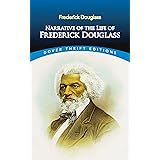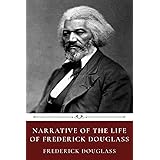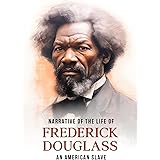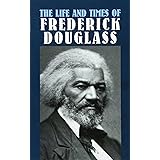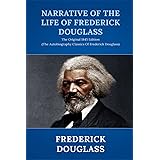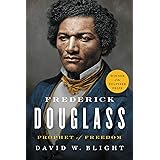
Download the free Kindle app and start reading Kindle books instantly on your smartphone, tablet, or computer - no Kindle device required.
Read instantly on your browser with Kindle for Web.
Using your mobile phone camera - scan the code below and download the Kindle app.

OK
 Audible sample Sample
Audible sample Sample 


Narrative of the Life of Frederick Douglass Hardcover – May 11, 2009
A masterpiece of American literature, Frederick Douglass' "Narrative" is a powerful story of an enslaved youth coming to social and moral consciousness by disobeying his owners and secretly teaching himself to read. Achieving literacy emboldens him to commit further acts of disobedience that ultimately lead him to escape to freedom. Angela Y. Davis explores key passages from Douglass, touching on the philosophical and political importance of self-knowledge, resistance in the pursuit of liberation, and the importance of Douglass to the Obama Generation.
- Print length116 pages
- LanguageEnglish
- PublisherBN Publishing
- Publication dateMay 11, 2009
- Dimensions6 x 0.44 x 9 inches
- ISBN-101607961210
- ISBN-13978-1607961215
- Lexile measure550L
Similar items that may deliver to you quickly
Product details
- Publisher : BN Publishing (May 11, 2009)
- Language : English
- Hardcover : 116 pages
- ISBN-10 : 1607961210
- ISBN-13 : 978-1607961215
- Lexile measure : 550L
- Item Weight : 12.2 ounces
- Dimensions : 6 x 0.44 x 9 inches
- Customer Reviews:
About the authors

Discover more of the author’s books, see similar authors, read author blogs and more

Discover more of the author’s books, see similar authors, read author blogs and more

Discover more of the author’s books, see similar authors, read author blogs and more

Discover more of the author’s books, see similar authors, read author blogs and more
Customer reviews
Customer Reviews, including Product Star Ratings help customers to learn more about the product and decide whether it is the right product for them.
To calculate the overall star rating and percentage breakdown by star, we don’t use a simple average. Instead, our system considers things like how recent a review is and if the reviewer bought the item on Amazon. It also analyzed reviews to verify trustworthiness.
Learn more how customers reviews work on AmazonReviews with images
-
Top reviews
Top reviews from the United States
There was a problem filtering reviews right now. Please try again later.
The significance of this book cannot be overestimated. In it, Douglass effectively dispels a number of popular myths about slaves and slaveholders, and forever changes the way the reader (especially one who lived while slavery still existed) looks at slavery. The theme of this book is very simple: slavery is wrong. It is evil, it is cruel, and, despite what many people thought at the time, the slaves know how cruel it is. Douglass cites several examples of the horrible treatment slaves received, one of them being separation of families. "It is a common custom...to part children from their mothers at a very early age" So it was with Douglass and his own mother.
Douglass writes in a very eloquent style, and this contributes to the power of this work. Many people who thought blacks were inferior in intelligence were shown to be sadly mistaken with the coming of Frederick Douglass, a man both educated and refined. It may be said that the book is not entirely fair, for it is decidedly anti-slavery, but it is undoubtedly true for most cases nonetheless. Most of the overseers in Douglass's narrative are demonic and sadistic, but when a good overseer comes along (such as Freeland), he is fair in his treatment of him.
One can imagine the fuel this book gave to the abolitionist fire, and it is not difficult to see why Douglass had such an impact on both North and South. This is, in my opinion, a definitive work, in that it shows the horrible institution of slavery in all its barbaric nature, and does it from a firsthand point of view, that of a former slave. This book was a tremendous contribution, both for the light it shed on slavery in general, and for proving that blacks were not intellectually inferior by nature, but instead were "transformed into...brute[s]" at the hands of their overseers.
This is a great book, essential for anyone wanting to study the Civil War era or wanting to gain a firmer understanding of slavery.
Personal Note:
I went to Maryland public schools in the 70's and early 80's. This was not on my required reading list. I wish it had been, but then maybe I would have hated it. The story of Frederick Douglas is to me overwhelming. The indictment of Southern Christianity is also particularly grievous. I do feel like I'm beginning to get a sense of the longtime North - South cultural divide as a matter of regional . . . religious . . . and economic ... pride.
Misc Notes:
1. Brer Rabbit - in the intro to my book - Robert O'Meally mentions Brer Rabbit and Disney's now banned (and well censored) in the USA "Song Of The South" movie (think "Zip-A-De-Do-Da") - I don't have any wisdom on this but Brer Rabbit is a vaguely forbidden character in our country, as is Bugs Bunny, who the writer indentifies as a modern day Brer Rabbit. I always liked Bugs Bunny, but you don't see these cartoons around. I have an older African American friend who asked me if I could find a copy of "Song of the South" which he had fond memories of watching in the movie theater as a kid. Well I couldn't . . .
2. In my appendix, there is mention of pro slavery arguements of the 1840's. One is to the effect of "Slavery itself doesn't hurt slaves . . . its the abuse of slavery by slaveholders that hurts slaves." Hmmm, that sounds familiar . . .
But I wish he had written more about how he learned to read and write.
Growing on a plantation, he probably spoke a dialect -- with grammar, vocabulary, and accent very different from standard English.
So it's hard to imagine how The Colombian Orator, an anthology of speeches by the likes of Washington and Franklin, could have been his primary self-teaching text.
It would be easy to imagine him having Bible passages drilled into him repeatedly as a child, and then, having learned the alphabet, phonetically deciphering Bible words and moving from that to newspapers etc.
But he says nothing about reading the Bible.
He mentions being taught the alphabet and little more than that by his master's wife. Then the lessons, stopped and he was deprived of any reading material, but yet he taught himself how to read, with the catch-as-catch-can help of young white boys.
Then, years later, he learns to write, apparently learning the alphabet all over again (?). And this time he has access to a dictionary and a speller, with no mention of how he got those.
His learning to read and leaning to write are two separate stories, like the two separate creation stories in the first two chapters of Genesis.
And he doesn't mention the challenge of mastering the white man's version of English and learning to read and understand pompous oratorical prose, the likes of which he had never heard.
Top reviews from other countries
Reviewed in Brazil on April 22, 2023


Content: This is in no way whitewashed. Language is blanked out. There are graphic descriptions of beatings & other physical harm inflicted upon slaves. Immorality abounded in the system and Douglass does not sweep this under the rug. Adultery & rape are frequently mentioned; also the common practise of slave owners to have children with their female slaves & the consequences of this. It's handled well & tastefully, but it is not veiled. Douglass' purpose was to be crystal-clear about the ills of slavery.
A Favourite Quote: "I would sometimes say to [these white boys], I wished I could be as free as they would be when they got to be men. “You will be free as soon as you are twenty-one, but I am a slave for life! Have not I as good a right to be free as you have?” These words used to trouble them; they would express for me the liveliest sympathy, and console me with the hope that something would occur by which I might be free."




